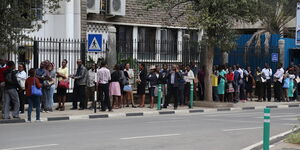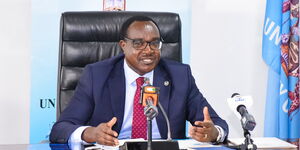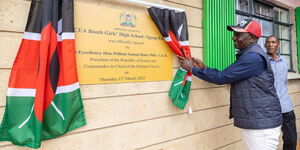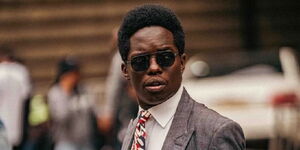As President Uhuru Kenyatta eulogised the late President Mwai Kibaki, he described him as an accomplished politician whose career revolved around public service.
While many remember him for ending KANU's 40-years reign, Kibaki had an illustrious career in politics. He cut his political teeth in 1963 when he was elected as a Member of Parliament.
He would later serve in some of the most revered positions in government, steering the country's economy from a third world one to a developing country level.
Here are the 6 positions held by the late Kibaki in and out of government;
President
The most powerful position Kibaki held was that of the Head of State - a position he held for 10 years. He was first elected as Head of State in 2002 through the National Rainbow Coalition (NARC), ending 24-years of the late Daniel Arap Moi.
He recaptured the seat in the 2007 General Election despite the vote being disputed by his then challenger, Raila Odinga.
In his first term, he picked the late Kijana Wamalwa as his Vice President while Wiper leader, Kalonzo Musyoka, was the Second-in-Command during his second term.
His memorable legacies include the Free Primary Education, Thika Super Highway, the 2010 Constitution and a vibrant economy.
Vice President
The second most powerful position Kibaki held was the post of Vice President in Moi's administration after his appointment in 1978. He held the position for 10 years and was succeeded by Josephat Njuguna Karanja.
Kibaki was demoted from the post by Moi over ideological differences.
Official Opposition
After contesting for the presidency in the 1997 General Election, Kibaki lost to Moi and served as the official leader of opposition after coming second in the polls.
During the General Election, he ran on a Democratic Party (DP) ticket and garnered 1,895,527 votes against Moi's 2,445,801 votes.
He later contested in the 2002 General Election and won after a majority of opposition leaders formed a grand coalition to defeat KANU.
Ministry of Finance
Another powerful position Kibaki held was that of the Minister of Finance. He was appointed to the position in 1969 by the founding President, Mzee Jomo Kenyatta.
At the time, he was serving as a Member of Parliament following Kenya's first election after gaining independence. His appointment was based on his career as an economist, having studied and graduated with a First class degree honours from Makerere University in 1955.
{"preview_thumbnail":"/files/styles/video_embed_wysiwyg_preview/public/video_thumbnails/tEwg2NBvTY4.jpg?itok=ub55MsH7","video_url":"","settings":{"responsive":1,"width":"854","height":"480","autoplay":0},"settings_summary":["Embedded Video (Responsive)."]}
Prior to his appointment, he served as Tom Mboya's assistant, and the duo was famed for drafting the Sessional Paper 10 of 1965, which aimed at creating an equitable distribution of resources and growing the country's economy.
Minister of Home Affairs
The late President was appointed as the Minister of Home affairs in 1982 while still serving as the Vice President.
Under this docket, he was tasked with overseeing the running of correctional services in the country.
Minister of Health
Following disagreements with his boss, Moi, Kibaki was demoted from the position of the Vice President in 1988, and lost the Home Affairs docket.
Consequently, he was appointed as the county's Health Minister and resigned from the position in 1991.












